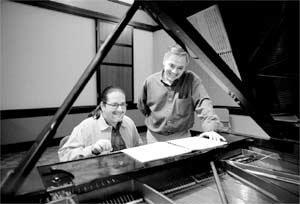A "rollicking and sexy farce" is how the creators of "Coyote's Dinner" describe their new one-act comic opera, to be premiered by the MIT Wind Ensemble on Friday, Nov. 30 in Kresge Auditorium.
Composed by music lecturer Charles Shadle with libretto by Michael Ouellette, senior lecturer in theater arts, "Coyote's Dinner" is unusual not only in its subject matter--a Native American folk tale--but because it's a rare, full-scale collaboration by faculty and staff in music and theater arts in an area of musical drama that has been largely unexplored at MIT: the genre of opera.
Shadle, a member of the Choctaw Nation, approached Wind Ensemble director Frederick Harris Jr. last year with the original idea for "Coyote's Dinner" and asked Ouellette to write a libretto about Coyote, the archetypal "trickster" found in numerous Native American folktales and legends. The work is based on a Lakota folk story, in which the devious and charismatic Coyote is outwitted by the long-suffering wife of his equally reprehensible friend Iktome.
In Ouellette's version, Coyote's story is enacted as a benefit play performed on a Native American reservation. Four choric figures serve as the audience for this "play within a play:" an anthropologist, her young assistant, a fundamentalist missionary and his young wife. The opera centers on their reactions to the drama.
"This turning of the tables, the underdog defeating the power figure, is reflected in what happens to the choric figures watching the dramatization," said Ouellette, who also directs the work. "The insuperable thing for me was to figure out how all the characters fit together. Things began to come together after that."
In composing the music, Shadle used a variety of styles to characterize the protagonists. "It was as if I had found the language that each spoke," he said. The character of Dr. Sidney Hill, the anthropologist, sings in a 20th-century expressionist idiom that signifies her association with academia. Rev. Hosiah Jones sings in a Sunday-school-like fashion and is accompanied by a saxophone quartet, whose sound is reminiscent of a church reed organ. The Coyote, a virtuoso baritone, takes on whatever musical style will help him achieve his end. "He can seduce with a tango, sympathize with fake 'Indian' music, or beguile with the pyrotechnics of bel canto opera," Shadle said.
Four of the seven vocal soloists are affiliated with MIT: senior Mary Tsien, soprano; graduate student Graham Wright, baritone; lecturer in music William Cutter, tenor; and baritone Phillip Lima, manager of planning and counseling services in Human Resources.
The additional three soloists are professionals from the Bos- ton area: Mary Ann Lanier, soprano; Hillary Nicholson, mezzosoprano; and Carlos Archuleta, baritone. The production is designed by MIT Theater Arts design staff.
CONFRONTING STEREOTYPES
Shadle said his Native American background made him particularly sensitive to the issues dealt with in "Coyote's Dinner." The piece, he emphasized, does not purport to be about Native Americans, but rather about how others expect them to be. To reflect this, he used stereotypical Hollywood "Indian" music for the Native Americans in the opera. "I tried to take 'trashy' materials and make them more honest," he said.
Shadle and Ouellette hope "Coyote's Dinner" will entertain as well as enlighten. "We want people to laugh, but we also want them to think," said Shadle. Ouellette described the opera as being about "exploding both liberal and conservative dogmatism"; Shadle added that it focuses on the interactions between the powerless and the powerful.
OPERA@MIT?
Both hope that the premiere of this work will spark a new interest in opera at MIT. "Opera is the one thing we haven't provided for our students," Shadle said. "If we could develop a tradition here of doing this [opera], it would be great for everyone."
The talent needed to produce an opera is already present at MIT, added Ouellette, who hopes "Coyote's Dinner" will showcase it. "We have the resources at MIT, but they're often overlooked," he said. The pair hope at some point to expand the work into a larger, full-scale opera.
"Coyote's Dinner" premieres on Friday, Nov. 30 at 8 p.m. in Kresge Auditorium and will be preceded by "Howl: the Making of an Opera," a pre-concert talk with the composer and librettist, at 7:15 p.m. Other works on the program include Mendelssohn's "Overture for Winds" (Op. 24), Hindemith's "Geschwindmarsch on a Theme by Beethoven" and Gould's "Ballad for Peace." Tickets are $3 at the door.
A version of this article appeared in MIT Tech Talk on November 14, 2001.






